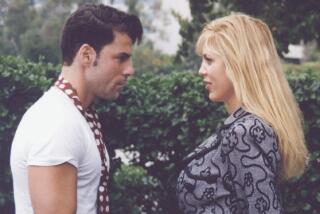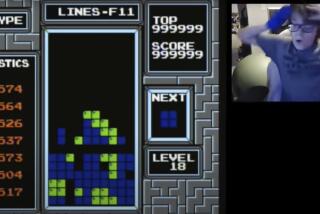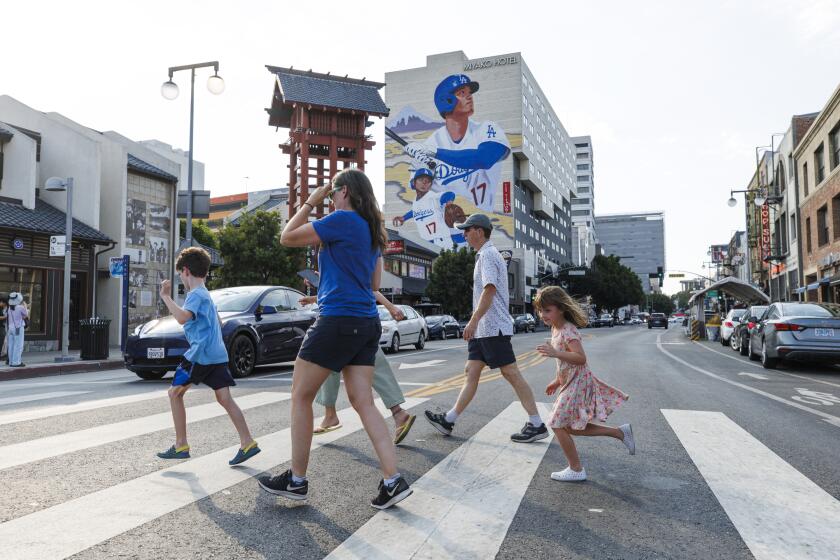Police abuse. Entitled white people: The most relevant, antiracist video game of 2020
On March 31, much of America was struggling to settle into a stay-at-home lifestyle enacted to stem the spread of a coronavirus. The gaming world, in particular, was obsessed with the just-released “Animal Crossing: New Horizons,” which became a phenomenon for providing cutesy connections and a sense of normalcy when many were lacking both.
Largely overlooked was “Treachery in Beatdown City,” a retro-styled video game that on the surface appeared to reference an era when games like “Double Dragon” were king more than it did the present day. Boasting a silly setup in which a president, clearly modeled after Barack Obama, is kidnapped by ninjas, “Treachery in Beatdown City” wasn’t overt in advertising that is actually a bracing work of political commentary.
“My game has certain aesthetics, and it’s been hard,” says Shawn Alexander Allen of the challenge of getting word out on the work, which was made with collaborator Manuel Nico Marcano.
Allen says some friends have advised him to get more to the point.
“Say, ‘You get to punch the racist.’ I don’t know how to make that my tagline. I don’t know if that would hurt or help. I think it is a little unclear whether or not my game has that messaging.”
It does.
“Treachery in Beatdown City,” available now for the Nintendo Switch and PCs, is one of the most relevant, of-the-moment video games of 2020, portraying a city on edge and on the verge of coming to blows. Its residents are made up of law enforcement who harass first and ask questions later, bikers and runners who behave as if they own the road, entitled white folks who may scream “officer” when a person of color tries to pet their dog — yes, before Amy Cooper called the cops with false charges against Christian Cooper in Central Park — and overall a world that runs on racial profiling.
Its opening scene features one of the game’s idealistic protagonists, Lisa Santiago, being mistaken for janitorial help while trying to report verbal abuse at her local gym. Bruce Maxwell doesn’t have it any better, as on every walk through the world of “Beatdown City” he’s mistaken for just about every other black resident, along the way encountering a cop who brags of all his arrests with selfies, a blond woman who cries censorship when he helpfully corrects her, not to mention dog walkers who are quick to label him, a mighty successful businessman with some impressive kick moves, a “thug.”
We can practically hear Bruce sigh as he says, via text panel, “I think we’re seeing a confluence of idiots and entitlement,” then commences to fight.
Then it’s time to rumble in battles that let players strategically piece together a string of moves to counter an opponent’s fight style. Rather than rely on button-mashing, we tactically choose combos from a list, and while many a fight has the losers coming back for more later, sometimes with officers in tow, occasionally there are lessons learned: “I shouldn’t have yelled at you for wanting to pet my dog.”
That mix of tones — intermingling harsh realities with exaggerated fight scenes, a vintage style and, above all else, humor — came naturally to Allen, in part because any random day in 2020 is filled with such variances.
“I follow a lot of very far left people, a lot of black revolutionaries, and poets and musicians, and also game people,” says the biracial Allen, who is a lead organizer of New York’s Game Devs of Color Expo. “So I see this stark divide of, ‘Here’s my dinner! Let’s play a fun thing!’ And then, ‘Here’s video of someone getting beaten by a cop. Here’s 100 of them. Here’s a super-cut.’ I watch a lot of that stuff. It keeps me angry. It helps me put words to things.”
It’s no doubt a reason why “Treachery in Beatdown City” feels so vital and reflective of our time. Its tales of police entering the wrong house, arresting innocents and spraying tear gas at protesters aren’t pulled from any one case so much as the last decade of American life.
But for the game’s characters, who mainly just want to figure out why the president was kidnapped, life is an endless series of hyper-reactive roadblocks, such as the woman who impedes their journey by talking endlessly about how she doesn’t want to go through the “sket-chay” part of town. “Hashtag inconvenient, am I right?” she says.
“Treachery in Beatdown City” wants to have a conversation with us through play. It does so by giving us bursts of dialogue, action, humor and brutal realism. Though the game has been in development since 2012, think of “Treachery in Beatdown City” as an interactive complement to films such as “Get Out” and “Sorry to Bother You,” both of which Allen cites as evidence that there was a need and a hunger for personal projects that address topics of racial inequality with directness.
What to play: ‘Coffee Talk’ and ‘Wide Ocean Big Jacket’ show how video games can help us listen and talk to each other.
“The fact that ‘Get Out’ was very micoaggression-heavy, the fact that the term came in vogue around then, made me able to describe my game a little better,” he says.
While one could find plenty of horror in the topics of “Treachery in Beatdown City,” this is a game that is consistently funny. Allen wants the jokes to hit hard and fast
“I saw somebody talking about how when they started playing my game they were put it off because it was very in-your-face, on-the-nose and overtly aggressive about racism,” Allen says. “Well, I’ve learned a lot from my stand-up comedian friends. You can’t tell jokes that don’t have a punch line, and you only have a few minutes to talk to each person.”
“Through the Darkest of Times,” set in Nazi-era Germany, asks players: Would you resist? Its developers say that if your game doesn’t include the horrors of the Nazi regime then your game shouldn’t include Nazis.
Allen is careful not to overly romanticize the decades-old games that helped inspire “Treachery in Beatdown City.” He notes that the game industry’s mix of art and commerce, as well as the often misguided insistence that games are apolitical, regularly results in questionable content decisions when it comes to representation. But looking back, he says it also isn’t a surprise that he was drawn at a young age to the original “Double Dragon” for the Nintendo Entertainment System.
It was a game, he says, in which he was able to see — sort of — characters who looked like him and his friends. “I always felt other-ed, and the nature of the city is people shout at you,” Allen says. “So when we played ‘Double Dragon’ — and ‘Double Dragon’ on the Nintendo, specifically — it was so abstract that you could imprint your existence on there.”
“Treachery in Beatdown City” is a natural evolution of that thought process, only now the characters are inspired by those in Allen’s actual existence.
“I was thinking, ‘What if “Double Dragon” — what if each character had a story, what if you had a real interaction with them and a reason to fight them? They’re not amorphous bad guys.”
They are very recognizable bad guys.
Allen can recount numerous examples from just the eight years he was working on the game. He recalled walking around his New York neighborhood in 2014 wearing a shirt that expressed support for those protesting the Ferguson, Mo., shooting death of a black teenager by a white police officer. Simply wearing the shirt brought constant fear that he would be stopped by police. Or, to be more precise, increased an already existing fear.
“One day when I was coming home from working on the game — I was working my day job and then worked on the game until 11 p.m — and got off the train at Bushwick and two white undercover cops stopped me,” Allen says. “One tried to do the ‘take off your headphones’ motion, which I didn’t do. I’m a New York pedestrian. I don’t take off my headphones. But then he flashed his badge and said I matched a description for someone who held someone up at knifepoint. Somehow I talked myself out of the situation, but it was the scariest moment in my life. I knew I shouldn’t have been talking back. It was dark and there was no one around.”
One could draw numerous parallels to today’s happenings and the stories in the game. Even the selfishly antagonistic bicyclists, for instance, will have people thinking of video that surfaced of a Maryland resident, who was later arrested, for antagonizing people who were posting fliers against police brutality along a bike path.
But this isn’t a game that was built for a moment of national protests; rather, it reflects various threads that have long been happening in America.
“I’m happy, if anything, that this thing I’ve been working on can speak to people and be a satire on it,” Allen says, adding that an overarching message of the game is, “How [awful] are people?” To wit: You won’t battle just corrupt cops in “Treachery in Beatdown City.” You’ll tackle the lawyers who defend them as well.
“It’s very bizarre because it’s getting shared a lot because everyone is making their ‘black game developer’ list,” he adds. “Those feel very strange to me. I don’t want to be your favorite black developer, just like no one wants to be your favorite white rapper.”
More to Read
The biggest entertainment stories
Get our big stories about Hollywood, film, television, music, arts, culture and more right in your inbox as soon as they publish.
You may occasionally receive promotional content from the Los Angeles Times.











